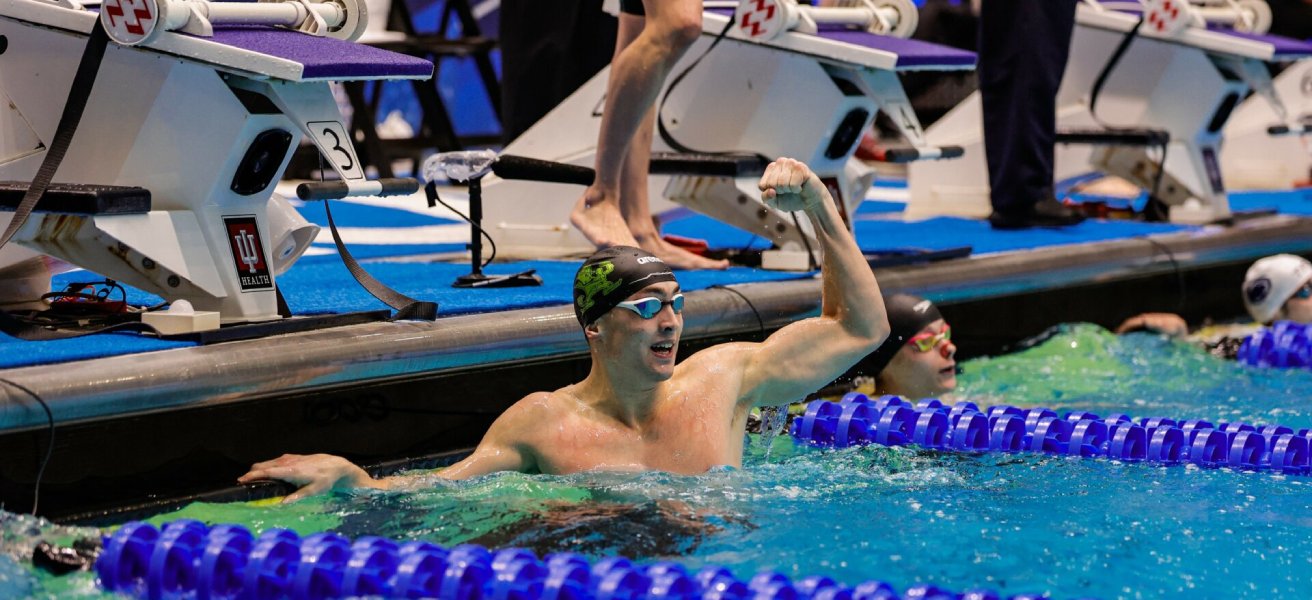Tanner Filion’s path to the University of Notre Dame is a testament to the power of planning, discipline, and consistent improvement. He didn’t follow the traditional trajectory of a highly recruited high school swimmer. Instead, he forged his own way, becoming a national champion at the Division III level before earning a scholarship to swim for Notre Dame as a graduate transfer. His story is a lesson in maximizing potential, not just in athletics, but in life.
A Unconventional Path to Notre Dame
Tanner’s path to Notre Dame wasn’t the usual route for Division I athletes. Overlooked by major programs in high school, he began his collegiate career at Whitman College, a Division III school.
“I never swam club,” Tanner admits. “I barely got recruited to DIII.” However, through dedicated training, he achieved national champion status, proving that hard work and strategic planning can overcome perceived limitations.
This success earned him a spot on the prestigious Notre Dame swim team as a graduate student—a testament to his resilience and exceptional time management skills. Balancing a high-level swimming program with rigorous academics required mastering executive function and efficient time management—critical skills that shaped his success.
The Role of Executive Function in Tanner’s Success
Tanner consistently emphasizes the role of executive function skills in navigating his dual life as a student-athlete. “Swimming taught me to break things down into small, manageable steps,” he explains. “It’s about improving 1% each day, both in and out of the pool.”
This process-oriented approach was needed to balance all of the demands of being a high-level student-athlete. He actively applied executive function skills, analyzing his daily routine, identifying areas for improvement, and implementing strategies for consistent growth.
This disciplined methodology translated directly to both his athletic performance and academic success at Notre Dame, where he balanced an intense training schedule with demanding coursework. This “1% better” philosophy embodies the principles of Growth Mindset.
Time Management Strategies: Balancing Swimming and Academics
At Notre Dame, Tanner’s schedule was packed. A typical day included early morning practices at 5:30 AM, classes from 9:00 AM to 2:00 PM, another practice in the afternoon, and study time in the evenings. Maintaining this kind of schedule required precise time management—a skill Tanner developed through both necessity and experience.
“One of the biggest keys to being successful in college is learning how to use those small gaps in your day,” Tanner shared. “If you’ve got an hour or two between classes or practice, that’s when you need to get work done.”
Tanner’s time management skills helped him stay on top of his studies and swim training. Instead of letting free time slip away, he used every available moment to stay productive. This allowed him to maintain balance in his life, a skill all student-athletes and busy students can learn from.
“I always made sure to stay ahead,” Tanner said. “If I had time between classes, I was studying or working on assignments so I wouldn’t be up all night later.”

Building a Support System: The Importance of Seeking Help
One of the most valuable lessons Tanner learned at Notre Dame was the importance of building a strong support system and asking for help when needed. Whether it was through office hours, tutoring, or access to sports psychologists, Tanner emphasized that even the most successful athletes and students rely on others for support.
“At Notre Dame, everyone uses the resources available—whether it’s academic support or mental health resources like sports psychologists,” Tanner said. “It’s not a sign of weakness. The best students and athletes use the most help.”
This mindset, rooted in strong executive function skills, highlights the importance of knowing when and how to seek help. For Tanner, asking for help wasn’t just about managing stress; it was about optimizing his time and staying on track with his goals.
The Mental Game: Visualization and Focus in Swimming
Swimming is often described as a mental game as much as a physical one. Tanner needed to develop the ability to manage anxiety and focus on the task at hand. As a Notre Dame swimmer, Tanner worked with sports psychologists to hone his mental skills, particularly around visualization and staying present in the moment.
“Swimming is 90% mental,” Tanner noted. “Visualization and winning the mental battle every day is just as important as physical training.”
Tanner’s focus on mental preparation is an important component of executive function. It allowed him to stay calm under pressure, whether it was in the pool during a national championship or juggling the demands of his academic life.

From D III Underdog to Notre Dame Success Story
One of the most inspiring aspects of Tanner Filion’s journey is his underdog mentality and growth mindset. Despite not being the biggest or most naturally gifted swimmer early on, he never let that define him. Instead, he focused on getting better each day, both in and out of the pool. His emphasis on time management, discipline, and executive function helped him not only succeed but excel at the highest levels of collegiate athletics.
“I always loved the underdog mentality,” Tanner said. “Proving people wrong and overcoming challenges makes success that much more rewarding.”
This growth mindset and process-oriented approach is something every student and athlete can benefit from.
Key Learnings from Tanner Filion
Tanner Filion’s path offers valuable lessons for anyone striving to achieve success in both academics and athletics. Here are the key takeaways from his story:
- Master Time Management: Tanner emphasized the importance of using every available moment, whether it’s a small break between classes or practice. Managing your time effectively allows you to stay ahead and avoid late-night stress.
- Improve Your Executive Function Skills: Strong executive function skills—such as planning, organizing, and staying focused—played a large role in Tanner’s success. These skills helped him break down big goals into smaller, manageable steps and stay on track, both in the pool and the classroom.
- Embrace the Process, Not Just the Outcome: Tanner’s focus was always on the small, daily improvements that would lead to long-term success. Instead of fixating on the end goal, he concentrated on getting 1% better every day, which ultimately led to his national championships.
- Ask for Help When Needed: Whether it was through academic support, sports psychologists, or professors, Tanner made the most of the resources available at Notre Dame. He recognized that the most successful people aren’t afraid to ask for help when they need it.
- Strengthen Your Mental Game: Swimming, as Tanner noted, is 90% mental. Visualization, focus, and managing anxiety are critical to performing well under pressure. Developing these mental skills can give you a significant edge in both athletics and academics.

- Surround Yourself with Support: Tanner credited much of his success to the people around him, from coaches to teammates to professors. Building strong relationships and holding each other accountable is important for personal growth and success.
- Stay Humble and Persistent: Despite his achievements, Tanner remained humble throughout his journey. His underdog mentality and willingness to work hard, even when the odds were against him, played a significant role in his ability to succeed at the highest levels.
By applying these lessons from Tanner Filion’s journey, students and athletes alike can build the discipline, resilience, and executive function skills needed to reach their own goals—both in and out of the classroom.
If you or someone you know could benefit from learning executive function skills—whether it’s improving time management or balancing academics and athletics—Untapped Learning can help. Our personalized coaching programs are designed to guide students in building the skills they need to thrive in both school and life.
Visit Untapped Learning to learn more about how we can help you or your student unlock their full potential and take the next step toward success.





